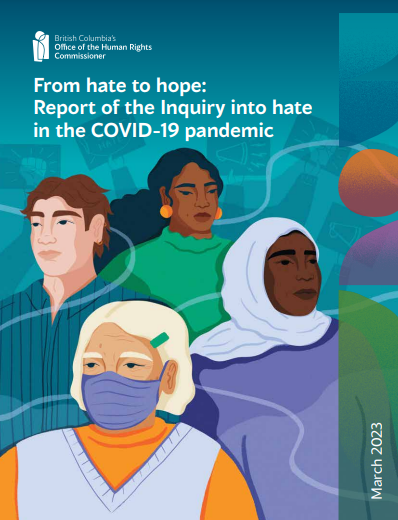B.C.’S Human Rights Commissioner, Kasari Govender, on Tuesday released the final report of the Inquiry into hate in the pandemic: “From hate to hope: Report of the Inquiry into hate in the COVID-19 pandemic.”
“The inquiry into hate in the pandemic has produced a mountain of evidence showing that hate incidents in B.C. have increased dramatically during the pandemic,” said Govender.
“While hate has deep roots in our province, the pandemic has produced the conditions for it to flourish—resulting in a broad range of hate incidents online and off, particularly anti-Asian hate and gender-based violence.”
Analysis of data provided to the Commissioner by police in B.C. shows that:
- Overall, the total number of hate incidents was 118% higher in 2021 than it was in 2019, jumping from 506 incidents in 2019 to 1103 in 2021.
- Hate based on race or ethnicity was 102% higher in 2021 than it was in 2019, jumping from 207 incidents in 2019 to 418 in 2021.
- Hate based on religion was 74% higher in 2021 than it was in 2019, jumping from 122 incidents in 2019 to 212 in 2021.
- Hate based on gender or sexual orientationwas 47% higher in 2021 than it was in 2019, jumping from 66 incidents in 2019 to 97 in 2021.
While analysis of police data reveals a troubling surge, the available data only begins to speak to what communities have experienced over the pandemic. Through hearings with more than 52 organizations and 100 individuals, a survey completed by more than 2,500 people in B.C., polling of a representative sample of the population, and research and information requests conducted by BCOHRC, the Inquiry report paints a more fulsome picture of what B.C. communities have experienced.

Other key findings from the Inquiry include:
- A lack of data on hate incidents that occur in different sectors and settings across the province is impeding action.
- Legal system and government responses to hate have been largely ineffective.
- Community responses to hate can be effective with adequate funding and centralized coordination.
“We cannot be surprised by the rise of hate in this pandemic or in future states of crisis, but hate in these circumstances is not inevitable,” said Govender. “We must confront what we have experienced during the pandemic and take action now to prevent it from happening again. We must be decisive in our compassion and creative in devising non-violent responses to hate.”
The Commissioner makes 12 recommendations in the report aimed at understanding hate and acknowledging its harms, building safety and belonging and fostering accountability and repair.
These include:
- Incorporating a human rights-based approach into existing emergency response procedures, including by providing widely available and low barrier access to mental health supports during times of crisis.
- Creating a community led province-wide centralized reporting mechanism for hate incidents, designed to provide support to victims-survivors and collect reliable data to inform public policy responses to hate.
- Requiring mandatory training for police on hate crimes response.
- Expanding significantly anti-hate curriculum throughout the K–12 education system so that all students develop the knowledge, skills and attitudes necessary to identify and combat hate and extremism.
- Reforming social media approaches to hate to increase accountability and transparency of platforms.
To see the full list of recommendations, see the Analysis and recommendations for change section here.











